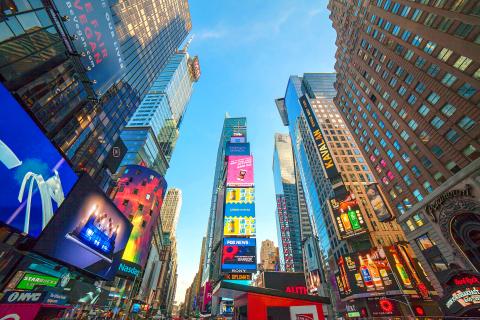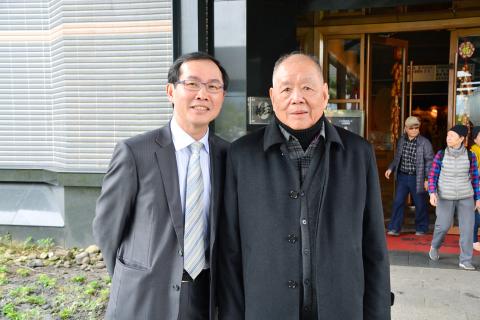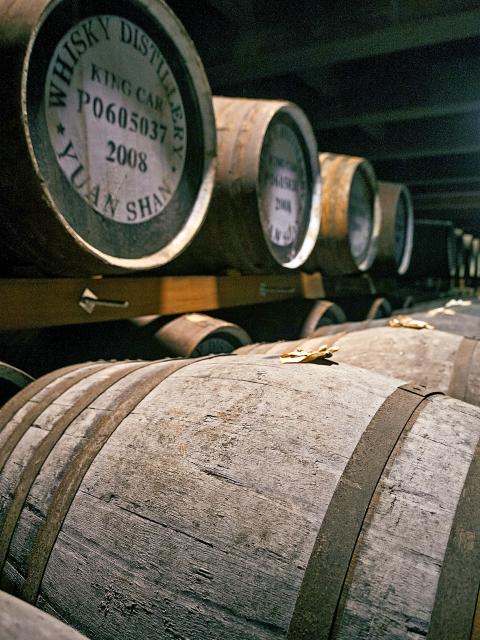Two lone customers are waiting by the free tasting area in the Kavalan distillery in Yilan County. The tasting session doesn’t start for another 10 minutes. A member of staff walks through the cordon.
“What’s here, then?” a customer asks.
“Jiu ah (酒啊),” she replies. Booze.

Photo courtesy of King Car Group
And that’s exactly what they can expect. Free tastings of some of the finest single malt whiskies known — a claim backed up by some of the world’s foremost whisky experts — proudly produced here in rural, sub-tropical Yilan.
Kavalan has picked up a total of 210 first prize awards since it started entering competitions in 2010.
The company’s Solist Amontillado Sherry — a touch of oak on the nose and a palate of soft sherry with a hint of caramel — was crowned the World’s First Single Malt Whisky Single Cask at the World Whiskies Awards (WWA) Dinner in London this year.

Photo courtesy of King Car Group
Last year, the WWA gave Kavalan’s Solist Vinho Barrique the Best Single Malt Whisky Award, officially making it the world’s best single malt whisky.
How long has it taken Kavalan whisky to scale these heady heights, and best the finest offerings of established distilleries in Scotland? Ten years.
Kavalan is the culmination of the dream of King Car Group (金車) Chairman Lee Tien-tsai (李添財) and his son, CEO Lee Yu-ting (李玉鼎). The company, established in 1979, launched the Mr. Brown Coffee (伯朗咖啡) brand in 1982 and opened the Yilan distillery in 2005. The production line was completed in only 9 months, following a viability study and the 2002 lifting of restrictions on private companies in Taiwan having their own breweries or distilleries. The company had its first Kavalan products on the market in 2008.

Photo: Taipei Times
Taiwan’s hot and humid climate, very different from that in Scotland, provides unique challenges and opportunities for Kavalan.
The yeast is imported from France, the malted barley from Scandinavia, as they cannot be grown in Taiwan; the company brought in consultants from Scotland; special whisky stills and equipment have been imported from Scotland and Germany.
Kavalan’s team of researchers, consultants, and master blender Ian Chang (張郁嵐) — who trained in England and Scotland — frequently travel abroad, to Europe and the US, in search of the best casks — sherry, port, bourbon, brandy — in which to mature Kavalan whisky. In fact, the team had just returned from Spain two days before the Taipei Times visited the plant. Old casks are simply not available in Taiwan, for the simple reason that Taiwan does not have a whisky producing tradition.

Photo: Taipei Times
Even storage presents its own set of problems, due to Taiwan’s sub-tropical climate.
But there are also definite advantages to producing whisky in Taiwan. The high temperatures allow the maturation process to happen far more quickly than it does in Scotland’s cold climate — thus far, Kavalan’s whiskies are typically left to age for four years — and the distillery has a plentiful supply of naturally-filtered spring water from the nearby Snow Mountain and the Central Mountain Range.
Spurred by its success in international competitions, Kavalan is now undertaking an ambitious expansion that will see production almost double from five million to nine million bottles a year when its latest extension is completed in December. Lee Yu-ting tells the Taipei Times that he has plans to continue expanding operations for the next 20 years.
Lee says that the main market for Kavalan is the domestic market here in Taiwan, but it sells the whisky in over 40 countries worldwide. The China market is not yet ready for premium single malt whisky, however, Lee says, and the main markets remain Europe and the US.
In fact, this year will see the company marketing its brand overseas. Earlier this year it paid for a series of advertisements in TIME and Newsweek, and has recently had its products emblazoned across a building in New York’s Times Square.
Times are looking good for the world’s first ever subtropical whisky distillery.
Warning: Excessive consumption of alcohol can damage your health.

Even by the standards of Ukraine’s International Legion, which comprises volunteers from over 55 countries, Han has an unusual backstory. Born in Taichung, he grew up in Costa Rica — then one of Taiwan’s diplomatic allies — where a relative worked for the embassy. After attending an American international high school in San Jose, Costa Rica’s capital, Han — who prefers to use only his given name for OPSEC (operations security) reasons — moved to the US in his teens. He attended Penn State University before returning to Taiwan to work in the semiconductor industry in Kaohsiung, where he

On May 2, Chinese Nationalist Party (KMT) Chairman Eric Chu (朱立倫), at a meeting in support of Taipei city councilors at party headquarters, compared President William Lai (賴清德) to Hitler. Chu claimed that unlike any other democracy worldwide in history, no other leader was rooting out opposing parties like Lai and the Democratic Progressive Party (DPP). That his statements are wildly inaccurate was not the point. It was a rallying cry, not a history lesson. This was intentional to provoke the international diplomatic community into a response, which was promptly provided. Both the German and Israeli offices issued statements on Facebook

May 18 to May 24 Pastor Yang Hsu’s (楊煦) congregation was shocked upon seeing the land he chose to build his orphanage. It was surrounded by mountains on three sides, and the only way to access it was to cross a river by foot. The soil was poor due to runoff, and large rocks strewn across the plot prevented much from growing. In addition, there was no running water or electricity. But it was all Yang could afford. He and his Indigenous Atayal wife Lin Feng-ying (林鳳英) had already been caring for 24 orphans in their home, and they were in

Australia’s ABC last week published a piece on the recall campaign. The article emphasized the divisions in Taiwanese society and blamed the recall for worsening them. It quotes a supporter of the Taiwan People’s Party (TPP) as saying “I’m 43 years old, born and raised here, and I’ve never seen the country this divided in my entire life.” Apparently, as an adult, she slept through the post-election violence in 2000 and 2004 by the Chinese Nationalist Party (KMT), the veiled coup threats by the military when Chen Shui-bian (陳水扁) became president, the 2006 Red Shirt protests against him ginned up by